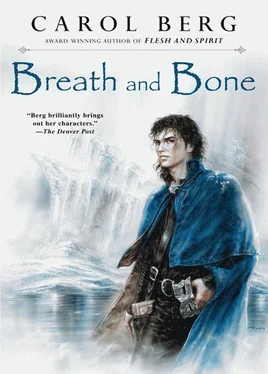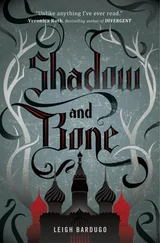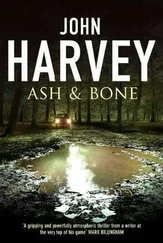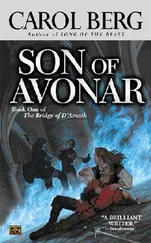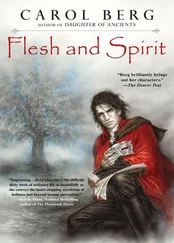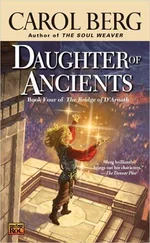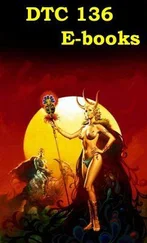The kitchen worktables had been shoved aside to clear the stone floor. Fire blazed—a broad ring of tall flames, scarlet and purple and the deepest blue of midnight, of storms, of bruises and pain. No fuel fed the flames; no hearth contained them. Within the fiery ring a stocky warrior lay dead, his body hacked and battered, the top of his skull caved in. Far worse than those mortal wounds were the fresh bloody holes that gaped where his eyes had once looked upon the world.
Prince Osriel—the gaunt, dark-haired man I knew as quiet, persuasive Gram—knelt beside the body, his velvet robes stained dark. Gore adorned the prince’s face, not random splatter, but precisely marked patterns of circles and lines on brow, temples, cheeks, and chin. The blood signs burned with a power of their own that thrummed in my head as music—songs of pain and bondage, of striking whips and cries of despair. The prince’s cupped hands, bloody to the wrist, held a calyx of carved stone—a shallow offering vessel as Iero’s worshipers used to carry fragrant oils to his altar. Wisps of gray smoke trailed from the vessel.
“…come weal, come woe, bound to my will and word until world’s end. Perficiimus.” Osriel’s chant rang clean and hard and sure.
As he lowered the bowl, I backed away, cracked open the door, and slipped unseen into the bitter night. A haze of smoke and freezing fog obscured the stars. Somewhere soldiers softly called the watch.
Pressing my back to the stone wall, I tried to erase what I had seen, to silence the truth articulated by that sonorous incantation. Holy gods, how many times had he done this? What use did he have for souls withheld from whatever peace lay beyond this life? The wall of midnight that had smothered the fields of Gillarine remained etched in my memory—behind the fire-breathing horses and monstrous cloud warriors, I had seen gray, transparent faces in the blackness, hungry…lost…angry. And now I understood what I had experienced this hour past.
Life or death. In alleyways, on battlefields, in taverns and hovels and fine houses, I had always been able to determine whether a wounded man was like to live or die, no matter if the last breath had left him. But never before without my hand touching his body. And never before had I lived the actual rending of the victim’s flesh and spirit. Somehow Osriel’s dread enchantment had opened a door, and my talent had taken me through it to a place I had no wish to go. Navronne’s rightful king, the world’s hope, my bound master…Holy Iero, preserve us all.
For better or worse, my stomach was long empty, thus I left little trace of my retching in the snow. Had matters been different, I might have spent the night in the open air trying to purge the odor of unclean magic that clung to my spirit. But cold and exhaustion drove me back to the guesthouse, along with a vague sense that the prince must not know I’d glimpsed what he was about. I was certainly not as ready as I’d thought to bare my own weaknesses to my master.
Every bone and sinew demanded that I bolt like Deunor’s fiery chariot from what I had just seen. It was one thing to accept Osriel’s admission of unsavory practices, and wholly another to feel their blight upon my own soul. Could I, who prated of free choices, serve a man who enslaved the dead?
Abbot Luviar had taught me that I could not sit out this war. And if I were to take a battle stance at Caedmon’s Bridge on this night, I would yet choose Osriel and his lighthouse over Sila Diaglou and the world’s ruin. But obedience…the loyalty I had been so ready to hand over not an hour since…that would be another matter.
Once back in the guesthouse bedchamber, I stripped and rolled up in the coarse wool blankets. But I did not sleep. Instead I traveled the boundaries of hell in the company of savaged corpses with bloodied eye sockets, of a master whose face was marked with blood signs, of a whirling Dané who spat gall. The agonies of a dying soldier wrote themselves over and over again in my soul, and a diseased knot burned in my gut, fiercer with each passing hour.
T he day birthed as gray and forbidding as my spirits. Voushanti did naught to improve matters. When I inquired what had become of the wounded messenger, he said only that Skay had succumbed to his injuries, and that Ervid had lapsed into a forgetfulness, so that he could not even remember how his lover had died. I wanted to be sick.
The scent of spiced cider, mingled with woodsmoke and the abbey’s ever-present residue of charred wool, wafted up the stair as I followed Voushanti down to the second floor of the guesthouse to meet the new arrivals. The mardane motioned me toward an open doorway to the left of the landing, then slipped down the stair before he could be seen.
Voushanti had reminded me forcefully that the prince’s disguise must be strictly maintained unless Osriel himself signaled otherwise, even with members of the cabal. Never had a man’s character confused me so. I had taken to Gram’s kind, morbidly cheerful ways in our first dealings, admired his intelligence, humility, and equable humor in the face of his employer’s irascible nature. I had believed him my friend and the only honest member of the lighthouse cabal. The absurdity near choked me as I pulled on the silken half mask and stepped into the room.
The sound of friendly argument welcomed me to the modest retiring chamber. Prior Nemesio was conversing energetically with a big man with a narrow beard, a beaklike nose, and the scuffed leathers and jewel-hilted sword of a noble warrior—Stearc, Thane of Erasku.
The talk ceased abruptly at my appearance. Rapidly melting snow dripped from the cloaks flung over chairs drawn close to a blazing fire.
“Cartamandua,” said Stearc, sounding wholly unsurprised. He finished removing his gloves and tossed them onto the drying cloaks. “So Prior Nemesio was right that Mardane Voushanti has left you here alone this morning?”
At Stearc’s right hand stood his daughter, Elene. Her close-woven braids gleamed the same bronze hue as her father’s hair, and her rugged garb and weaponry reflected the same martial seriousness. I hated that I could not give full attention to her blooming loveliness. But Osriel…Gram…sat bundled in blankets beside the fire.
“Prince Osriel and his main force departed in the night,” said the prior before I could answer. “Voushanti rode out to Elanus before dawn in search of fresh horses. I was something surprised the vile fellow would leave Brother Valen unguarded after yesterday’s unpleasantness, but he told me he did not wish the pureblood to be seen in town.”
I was grateful that Nemesio’s eager report prevented me having to affirm this nonsense.
“Fortunate for us,” said Gram. “Valen, we could use your talents to aid us in the search for Jullian and Gildas. Neither Lord Stearc nor Mistress Elene has found any trace of them.”
“You may have whatever you need of me,” I said, trying not to imagine his sober, pleasant face marked with unholy blood. “I just want to find the boy.”
“It is nonsensical to go chasing off into the wild until we receive the reports from the Sinduria’s spies,” said Elene sharply, clenching her fists as if to extract some sense from the air. “We’ve no idea where Sila Diaglou might be, and we’re all more tired than we’ll admit. Each of us would give his heart’s blood to see Jullian safe, but we need everyone fit, so perhaps, for once, insufferable pride and infernal stubbornness won’t trump reason and planning. Our purposes are ill served if one of us falls off his horse and must be scraped up and put back on again.”
Gram threw his blanket aside and rose from his chair, his lean frame straight and confident beneath his sober garb. The heat of the fire had painted his gaunt cheeks scarlet. “Mistress, you know how many days must pass until we can gather reliable reports. If Valen’s talents can give us direction, we should use them. If it is my infirmities that concern you, let me ease your mind. I’ve not been floundering in weakness all morning, but rather trying to give some thought to strategy. May I speak freely, Lord Stearc?”
Читать дальше
